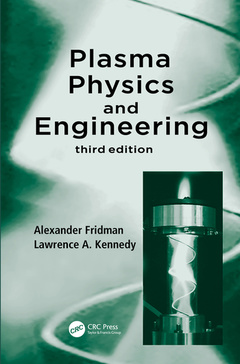Plasma Physics and Engineering (3rd Ed.)
Auteurs : Fridman Alexander, Kennedy Lawrence A.

Plasma Physics and Engineering presents basic and applied knowledge on modern plasma physics, plasma chemistry, and plasma engineering for senior undergraduate and graduate students as well as for scientists and engineers working in academia; research labs; and industry with plasmas, laser and, combustion systems. This is a unique book providing a clear fundamental introduction to all aspects of modern plasma science, describing all electric discharges applied today from vacuum to atmospheric pressure and higher, from thermal plasma sources to essentially cold non-equilibrium discharges. A solutions manual is available for adopting professors, which is helpful in relevant university courses.
- Provides a lucid introduction to virtually all aspects of modern plasma science and technology
- Contains an extensive database on plasma kinetics and thermodynamics
- Includes many helpful numerical formulas for practical calculations, as well as numerous problems and concepts
- This revised edition includes new material on atmospheric pressure discharges, micro discharges, and different types of discharges in liquids
Prof. Alexander Fridman is Nyheim Chair Professor of Drexel University and Director of C. & J. Nyheim Plasma Institute. His research focuses on plasma approaches to biology and medicine, to material treatment, fuel conversion, and environmental control. Prof. Fridman has almost 50 years of plasma research in national laboratories and universities of Russia, France, and the United States. He has published 8 books, and received numerous honors for his work, including Stanley Kaplan Distinguished Professorship in Chemical Kinetics and Energy Systems, George Soros Distinguished Professorship in Physics, the State Prize of the USSR, Plasma Medicine Award, Kurchatov Prize, Reactive Plasma Award, and Plasma Chemistry Award.
Prof. Lawrence A. Kennedy is Dean of Engineering Emeritus and Professor of Mechanical Engineering Emeritus at the University of Illinois at Chicago and Professor of Mechanical Engineering Emeritus at the Ohio State University. His research focuses on chemically reacting flows and plasma processes. He is the author of more than 300 archival publications and 2 books, the editor of three monographs and served as Editor?in-Chief of the International Journal of Experimental Methods in Thermal and Fluid Science. Professor Kennedy was the Ralph W. Kurtz Distinguished Professor of Mechanical Engineering at OSU and the Stanley Kaplan University Scholar in Plasma Physics at UIC. Prof. Kennedy is also the recipient of numerous awards such as the American Society of Mechanical Engineers Heat Transfer Memorial Award (2008), and the Ralph Coats Roe Award from ASEE (1993). He is a Fellow of the American Society of Mechanical Engineers, the American Physical Society, the American Institute of Aeronautics and Astronautics and the American Association for the Advancement of Science.
PART 1. FUNDAMENTALS OF PLASMA PHYSICS AND ENGINEERING. CHAPTER 1. Plasma in Nature, in Laboratory, and in Industry. CHAPTER 2. Elementary Processes of Charged Species in Plasma. CHAPTER 3. Elementary Processes of Excited Molecules and Atoms in Plasma. CHAPTER 4. Plasma Statistics and Kinetics of Charged Particles. CHAPTER 5. Kinetics of Excited and Active Neutral Particles in Plasma. CHAPTER 6. Electrostatics, Electrodynamics and Fluid Mechanics of Plasma. PART 2. PHYSICS AND ENGINEERING OF ELECTRIC DISCHARGES. CHAPTER 7. Glow Discharge. CHAPTER 8. Arc Discharges. CHAPTER 9. Non-Equilibrium Cold Atmospheric Pressure Plasmas. CHAPTER 10. Plasma Created In High Frequency Electromagnetic Fields: Radio-Frequency (RF), Microwave and Optical Discharges. CHAPTER 11. Discharges in Aerosols, Dusty Plasmas. CHAPTER 12. Electron Beam Plasmas. CHAPTER 13. Microdischarges (new chapter). CHAPTER 14. Discharges in Liquids. (new chapter). CHAPTER 15. Discharges of Plasma in Medicine. (new chapter).
Prof. Alexander Fridman is Nyheim Chair Professor of Drexel University and Director of C.&J. Nyheim Plasma Institute. His research focuses on plasma approaches to biology and medicine, to material treatment, fuel conversion, and environmental control. Prof. Fridman has almost 50 years of plasma research in national laboratories and universities of Russia, France, and the United States. He has published 8 books, and received numerous honors for his work, including Stanley Kaplan Distinguished Professorship in Chemical Kinetics and Energy Systems, George Soros Distinguished Professorship in Physics, the State Prize of the USSR, Plasma Medicine Award, Kurchatov Prize, Reactive Plasma Award, and Plasma Chemistry Award.
Prof. Lawrence A. Kennedy is Dean of Engineering Emeritus and Professor of Mechanical Engineering Emeritus at the University of Illinois at Chicago and Professor of Mechanical Engineering Emeritus at the Ohio State University. His research focuses on chemically reacting flows & plasma processes. He is the author of over 300 archival publications and two books, the editor of three monographs and served as Editor–in-Chief of the International Journal of Experimental Methods in Thermal and Fluid Science. Professor Kennedy was the Ralph W. Kurtz Distinguished Professor of Mechanical Engineering at OSU and the Stanley Kaplan University Scholar in Plasma Physics at UIC. Prof. Kennedy is also the recipient of numerous awards such as, the American Society of Mechanical Engineers Heat Transfer Memorial Award (2008), the Ralph Coats Roe Award from ASEE (1993). He is a Fellow of the American Society of Mechanical Engineers, the American Physical Society, the American Institute of Aeronautics and Astronautics and the American Association for the Advancement of Science.
Date de parution : 09-2023
17.8x25.4 cm
Date de parution : 02-2021
17.8x25.4 cm
Thèmes de Plasma Physics and Engineering :
Mots-clés :
Plasma Statistics; Electrostatics; Discharges; microdischarges; plasma medicine; electric discharges; Electron Energy Distribution Function; Ionization Rate; Plasma engineering; Vibrational Excitation; Plasma chemistry; Electric Field; Combustion systems; Ion Ion Recombination; Plasma physics; Cathode Layer; Dissociative Attachment; Specific Energy Input; Electron Attachment; Charged Particles; Plasma Centrifuge; Positive Column; Cathode Spot; Relativistic Electron Beams; Electron Ion Recombination; Energy Efficiency; Corona Discharge; Secondary Electron Emission; Normal Current Density; Current Density; Thermal Plasma; Degradation Spectrum; Dusty Plasma; Glow Discharge; Normal Glow Discharge



